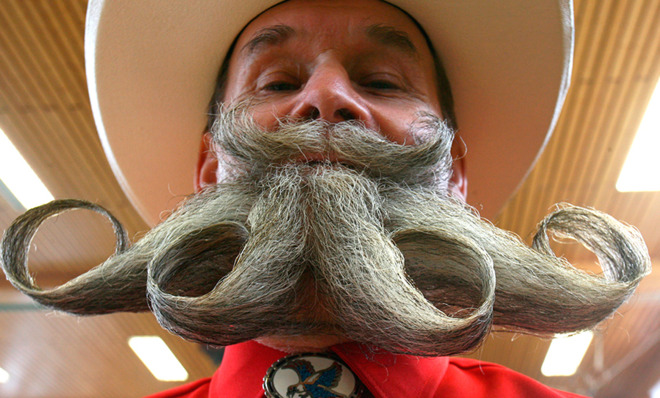8 delightfully strange beard and mustache words
Time to marquisotte that ziff, you weirdie

A free daily email with the biggest news stories of the day – and the best features from TheWeek.com
You are now subscribed
Your newsletter sign-up was successful
1. dasiberd
An insult of the 15th century variety, a dasiberd is a fool or simpleton. Another form is dasybead, says the Oxford English Dictionary, as formed by combining dazy, "in a dazed condition," and beard, either with the idea of a beard representing a man in general, or a scatter-brained man during a time when "most European men were clean-shaven."
2. frumbierding
The Week
Escape your echo chamber. Get the facts behind the news, plus analysis from multiple perspectives.

Sign up for The Week's Free Newsletters
From our morning news briefing to a weekly Good News Newsletter, get the best of The Week delivered directly to your inbox.
From our morning news briefing to a weekly Good News Newsletter, get the best of The Week delivered directly to your inbox.
According to the Online Etymology Dictionary, a frumbierding is "an excellent Old English word meaning 'a youth.'" The frum part of the word means "first, beginning"; bierd means "beard"; and -ing acts like the diminutive suffix -ling, typically used to describe the small, young, or unsophisticated. Put that all together and you get a young, inexperienced dude with some peach fuzz.
3. marquisotte
To marquisotte, says the OED, means "to shave or trim (the beard) with exaggerated fastidiousness." The word is related to the French barbe faite à la marquizotte, a beard "cut after the Turkish fashion," and perhaps also the Spanish a la marquesota, a mid-16th century style of dress, and the Catalan marquesota, "denoting a ruff or starched collar."
4. out of print
A free daily email with the biggest news stories of the day – and the best features from TheWeek.com
Out of print commonly refers to books no longer in circulation, but it's also slang for a messy beard, according to the OED.
The 19th century term is opposed to in print, meaning "exactly in order." In print may have referred specifically to "the plaited or pleated ruff," but why isn't clear. It could be from the "exact regularity" of printing or the "pressing or crimping" of a ruff's pleats to make them "stand out in proper parallel order."
5. pogonotrophy
Pogonotrophy is the growing or cultivating of a beard or mustache. Pogon- is a Greek combining form that means "the beard," while tropho means "food, nourishment." Other pogon- words include pogonology, the study of beards; pogonophile, one who loves beards; and pogonophobia, the fear of beards.
Misopogon, or Beard-Hater (where miso- is the combining form for "hate"), is a satirical essay by Roman Emperor Julian, in which he satirized "himself and the philosopher's beard which he wore in a clean-shaven age."
6. trichotillomania
Trichotillomania is the compulsion to tear out the hair from one's head or face and — get ready for it — eat it.
The word is Greek in origin, with tricho- coming from trikhos, "hair"; -tillo- from tillesthai, "to pull out"; and -mania from well, mania, "madness; frenzy; enthusiasm."
What happens when you eat a lot of hair? You don't want to know.
7. weirdie
Although the Scots' weirdie now means the same thing as weirdo, when it came about in 1894, it referred to "any young man with long hair and a beard," according to the OED.
Starting in the 1890s, says the National Portrait Gallery, "an increasing emphasis on tidiness and tailoring was characteristic of men's fashions in Britain and America." Beards were still popular, "but were more commonly seen in trimmer, more manicured or sober styles." Moreover, "it became more typical for younger men to wear their hair short and to cultivate moustaches in bushy, drooping or pointed styles."
Other hirsute, somewhat derogatory terms are longhair, a hippie or one dedicated to the arts, and neckbeard, a "slovenly" nerd.
8. ziff
Ziff, Australian for beard. The OED says this slang term originated around 1919, but otherwise the origin is unknown. To be ziffed means to be bearded.
Angela Tung's essays on language and culture have appeared at Mental Floss, Quartz, Salon, The Week, The Weeklings, and Wordnik. Her personal essays have appeared at The Frisky, The Huffington Post, and elsewhere.
-
 El Paso airspace closure tied to FAA-Pentagon standoff
El Paso airspace closure tied to FAA-Pentagon standoffSpeed Read The closure in the Texas border city stemmed from disagreements between the Federal Aviation Administration and Pentagon officials over drone-related tests
-
 Political cartoons for February 12
Political cartoons for February 12Cartoons Thursday's political cartoons include a Pam Bondi performance, Ghislaine Maxwell on tour, and ICE detention facilities
-
 Arcadia: Tom Stoppard’s ‘masterpiece’ makes a ‘triumphant’ return
Arcadia: Tom Stoppard’s ‘masterpiece’ makes a ‘triumphant’ returnThe Week Recommends Carrie Cracknell’s revival at the Old Vic ‘grips like a thriller’